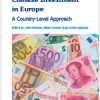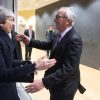Theme
After snap legislative elections in October a new government coalition will now redefine Austria’s commitment to European integration.
Summary
Trust in national and European politics has suffered simultaneously over the past decade in Austria. Euroscepticism and discontent with the functioning of the EU is widespread, yet Austrians are well aware of the benefits of belonging to the Union. The Brexit vote and the unstable international environment have even raised support for EU membership. Nevertheless, the economic and financial crises, the transit of over a million people in the autumn of 2015 and the challenging integration of around 150,000 refugees as well as a strong EU immigration into Austria have not gone unnoticed. The differences of opinion and the resulting polarisation of society have changed the political landscape. After snap legislative elections in October a new government coalition will now redefine Austria’s commitment to European integration.
Analysis
When Austria joined the EU 22 years ago, it could hardly have been expected that public opinion would turn around in the years to come. The remarkably high support for EU membership of 66.6 %1 was not least the result of a nationwide information campaign, supported by the federal government and nearly all major societal players. Once the mission was accomplished, the efforts abruptly ended. The referendum had raised high expectations that could not easily be met, and major Austrian political players quickly took to a comfortable blame-game with Brussels, even for some of the shortcomings in their own policy-making. The absence of an active debate on the pros and cons of European politics, which admittedly can be quite technical, led to indifference. Time and again citizens’ concerns were left unaddressed. EU critics and the mass media used the information gap to shape public opinion against a faceless Union by depicting themselves as the voices of the ‘people’.
In 2000 the diplomatic measures imposed on Austria by 14 EU member states in reaction to a federal government coalition with the right-wing Austrian Freedom Party (FPÖ) cast a shadow over the relationship between Austria and its EU partners.2 Price increases in some areas following the introduction of the euro, as well as Eastern enlargement, raised concerns regarding national sovereignty. They also amplified competition and the question of the fair distribution of economic benefits. Discontent surrounding EU bureaucracy, imperfect democratic procedures at the EU level and Austria being a net contributor to the EU budget further polarised public debate. The perception that European integration was speeding up globalisation while not managing its downsides fuelled Euroscepticism. Despite Austria being an open and small economy and rated as one of the most internationalised countries, globalisation is regarded by many as a threat to long-term achievements such as high environmental and social standards. The uncertain aspects of ever-increasing interconnectedness, mobility and digitalisation lead some people to glorify a seemingly better past, ignoring the shortcomings of pre-EU Austrian state structures.
Still today the image of the EU suffers from divergent views, struggling to provide effective and sustainable answers to current challenges. This was especially true during the economic and financial crisis, when the structural shortcomings of the Eurozone became apparent, and during the migration crisis that came to a head in Austria during the summer of 2015. As a result, trust in politicians dramatically decreased. It came as no surprise that, according to a survey of the Austrian Society for European Politics of March 2017,3 73% of Austrians described the EU as ‘weak’ and 51% as ‘insecure’. Only 31% think that ‘carrying on’ as it has so far is a good option for the Union, while 69% want the EU to concentrate exclusively on certain policy areas.4 The loss of confidence in the common currency during the years of economic turmoil was particularly alarming, because the euro was widely regarded as a key to stability and an important element in shaping a European identity. After a peak in confidence in March 2010 (70% had a very high or high confidence in the euro), it decreased to 38% in September/October 2012 and since then it has stabilised at around 50%.5
The missing link
Questions regarding European solidarity moved to centre stage in the debate, an element also very much stressed during the recent quota discussion on the relocation of refugees.6 More than one million people transited through Austria in the autumn of 2015, close to 150.000 —more per capita than Germany— requested asylum and many of them will stay and still need to be integrated. Uncertainty was fuelled by the perceived helplessness of public institutions at the national borders and the lack of convincing strategies regarding the overall refugee situation. Contradictory and often alarming statements, selective reporting of crimes committed by refugees and asylum seekers, the growing criticism of Germany’s refugee strategy and concerns regarding the effectiveness of pan-European plans aggravated the lack of trust. Whereas —especially in the autumn of 2015— humanitarian aspects dominated the public discourse, sentiments changed following sexual assaults on women in Cologne, Germany, on New Year’s Eve of 2015/16. Mistrust in politics and the media increased, as they were suspected of not communicating the entire truth. Some even interpreted the national governments’ prolonged focus on refugees as neglecting their ‘own’ citizens’ problems. In addition, anti-globalisation tendencies, suspicion of foreign workers in general and a —at that time— weak economic outlook made for an explosive mix. Thus, the political rhetoric focusing on European values was quickly replaced by an ever-stricter security discourse. Those who still proclaimed a Willkommenskultur —the ‘2015 word of the year’— have continuously been pushed to the margins and were derided as ‘do-gooders’ in public discussions.
At the same time, protectionist and anti-globalisation sentiments were also evident in discussions on the TTIP and CETA. Politics again failed to lead the debate over potential benefits and risks of comprehensive free-trade and international economic agreements. Again, the topic was left to other players —especially NGOs and the sensationalist press—. With no ‘official’ government commitment to address concerns and misconceptions, there was plenty of room for rumours that fostered unease. An emotionalised public debate limited the readiness to compromise. Publicly expressed disagreement between the parties in power aggravated the situation, and last-minute attempts for citizen involvement did little to counter it.
Support for EU membership on the rise
Nevertheless, a broad and stable —though relatively silent— majority of Austrians are in favour of EU membership. Since 1995, 54 Austria-wide opinion surveys have shown that an average of 70% of respondents want Austria to stay in the EU, while 23% would prefer to leave. The highest support for EU membership was recorded in June/July 2002 (80%), and the strongest support for leaving the EU in June/July 2008 (33%).7 The volatile international environment and in particular the political turbulence in the UK after the Brexit vote also left their mark. The number of Austrians wanting to stay in the EU increased by 15 percentage points —on a year-to-year basis—, whereas the desire among those in favour of leaving the Union decreased instantly by 8 percentage points.
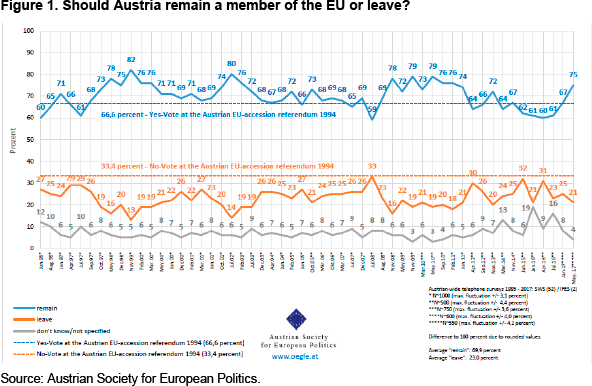
(Click to enlarge)
Against this background and with a clear public opinion in favour of Austria being an integral part of the EU, FPÖ politicians —at least for the time being— have refrained from calling for a referendum on Austrian EU membership. Austrians may wish for a different design of the EU, but the vast majority show no interest in leaving. They might not have fallen in love with the EU single market, but at the end of the day they have a realistic and pragmatic view of EU membership. People sense that, particularly in uncertain times, the best option for a medium-sized export-driven country is to stay at the very centre of European integration. Moreover, personal benefits such as passport-free travel, the practical advantages of a common European currency, the free movement of goods and services, consumer benefits and European youth exchange programmes are highly appreciated. The EU’s many problems have clearly diminished confidence in an increased complex political process, whether on a national or European level. Still, Austrians are well aware that cross-border challenges can only be solved together and would like to see a stronger and more focused EU that finally meets their expectations.
Changing the political landscape: snap legislative elections in Austria
Clearly, the starting position for several trend-setting elections in Europe in 2017, eg, in the Netherlands, France, Germany, Austria and the Czech Republic, was far from ideal. Although pro-European forces prevailed, the polarisation led to significant gains for nationalistic, protectionist, right-wing and sometimes even xenophobic forces. They might not be strong enough to join the respective governments in each member state, but their positions gain influence as they become increasingly part of mainstream politics. The legislative elections in Austria on 15 October 2017 were no exception to this.
The Conservative party (ÖVP) under its new leading candidate, Sebastian Kurz, had called for snap elections and emerged as the largest party with 31.5% of the vote, a gain of 7.5% compared with 2013. Kurz, who is aged 31 and has already gained experience in government as Minister of Foreign Affairs and Secretary of State for Integration, managed to reshape the image of his mainstream party promoting a Macron-style ‘movement’, centred around his own personality. Although his party has been in government for the last three decades, he credibly exploited the slogan ‘time for something new’. Kurz adopted a restrictive and defensive stance on immigration and —similarly to the UK— suggested ‘taking back control’, thus limiting the political space of the FPÖ. He has selectively pushed the ÖVP further to the right, specifically on issues like political Islam. Before his rise, opinion surveys concluded that the FPÖ would win the election.
The Social Democrats (SPÖ) and its leading candidate, Chancellor Christian Kern, came second with 26.9% of the vote. The SPÖ had been the biggest party after the last legislative elections in 2013 and has led the government since 2007. Although the SPÖ could slightly increase its vote in the elections, it is still at an all-time historical low when considering results prior to 2013. However, compared with other EU-countries, its results can be considered relatively stable, although it failed to retain the chancellorship. Its political discourse might have been too complex and inconsistent and its party structure was fragile. At times of perceived migration and integration challenges, social and economic issues —the central topics of the SPÖ— failed to have the sufficient emotional leverage to further mobilise voters.
The FPÖ, headed by Heinz-Christian Strache, came third with 26% of the vote, only slightly behind the SPÖ and gaining nearly 6% compared with 2013. As the main opposition party it benefited from the paralysis of the traditional Austrian grand coalition and a certain degree of public fatigue regarding the political establishment. The FPÖ is clearly seen to be more experienced than its political counterparts in, for instance, France and the Netherlands. For the time being it has succeeded in promoting tough law and order policies. In comparison with the parties of Le Pen and Geert Wilders, it has become more moderate on EU affairs and refrained from a radical anti-Euro and anti-EU rhetoric. While in other European countries such as Germany right-wing populist parties have only recently gained serious political weight, the political field of nationalism in Austria has long been occupied by the FPÖ, which has been a part of the political landscape for decades.
The three-way contest has left almost no political space for smaller parties in Austria, with the Greens being excluded from parliament.8 It also comes as no surprise that the issue of migration and integration was the decisive and divisive topic of the election campaign, while the economic situation was of only secondary importance The political discourse focused on values, education and identity, but in particular on safety, control, security and borders. The consequence was the emotional polarisation of the public. A deeply-rooted fear of the unknown as well as of the deterioration of the standard of living returned to the surface. The topic of integration was further leveraged by the strong immigration trend in the Austrian labour market from other EU-countries of Central Europe.9
The urban-rural divide was also very present. Integration is mainly a city phenomenon, but it was above all people in the countryside whovoted for ÖVP and FPÖ, demanding strong-hand politics.
The question of more direct democracy is another recurring element. The Brexit case and others, eg, the Dutch referendum regarding the EU-Ukraine association agreement, demonstrate that national referendums on complex issues can turn into double-edged swords, which often stoke up protest rather than give rise to an arena for a sober evaluation of the issue at hand or for reasonable compromise. The FPÖ is particularly eager to promote national referendums, using Switzerland as an example. These claims are strongly interconnected with its criticism of representative democracy, its hope of permanent agenda-setting, campaigning and mass mobilisation and its likely intention to decelerate or even reverse European integration.10
Sebastian Kurz was invited by the Austrian President to form a new government on 20 October. Coalition talks with FPÖ are well under way and due to the many similarities in the party programmes, a new conservative-nationalist government is expected to be in place before Christmas. The SPÖ will try to consolidate itself by playing the role of the main opposition party. It would probably have been naive to expect a substantial discussion of European developments during the election campaign in Austria. It was postponed, but not annulled.
The new Austrian government and Europe: let us agree to disagree
The new government wants to be seen as a pro-European government right from the start, although with a ‘taking back control’ slant and the persistent EU scepticism of the junior partner, the FPÖ. In this context, public expectations are also quite clear.
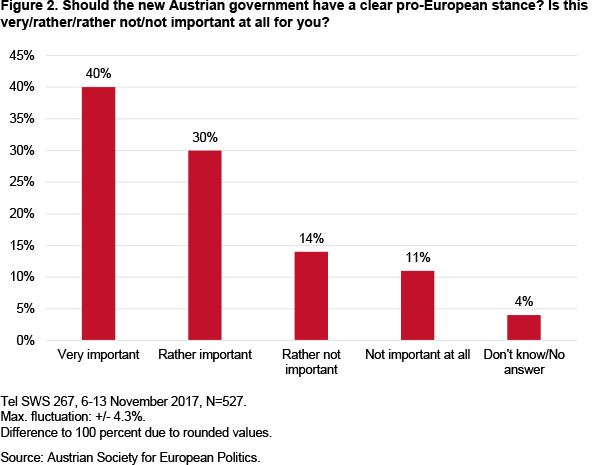
As usual, the devil is in the detail. The two coalition partners so far agree on a better implementation of the European principle of subsidiarity and support reform scenario four of the European Commission’s ‘Doing less more efficiently’.
The five options for Austria
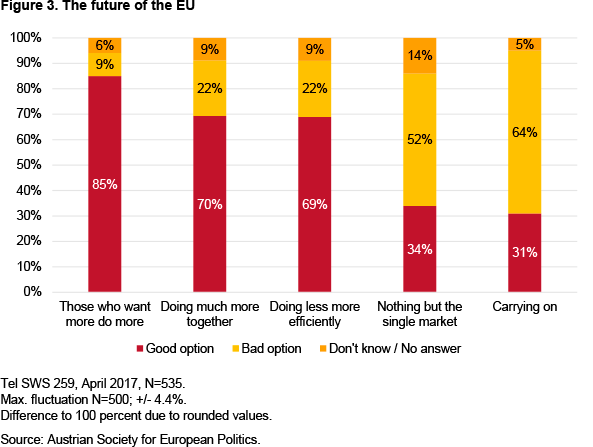
So far, both parties want to see a rearrangement of the Union’s core competences, with a particular focus on returning power to the member states and a preference for downsizing the EU’s bureaucratic structures. They could both agree on a common criticism of EU-relocation quotas for refugees, favouring instead a deepening of cooperation in defence and security issues while promoting a tougher external border management and off-site refugee detention centres. Migration and integration will clearly remain at the centre of government action, where access to social benefits —also for EU-citizens— will be under pressure. ‘Our money for our people’ could become one of the unuttered mission statements and they could continue to show similarities with the strategic inclination of the British government. The new government will strongly argue against filling the financial gap in the future EU budget caused by the UK’s departure from the Union. A further deepening of the Euro area will be cautiously welcomed unless major elements of national sovereignty are affected and a transfer union is established without clear-cut binding rules and mutual benefits. One of the main differences with the previous government will likely be the lack of support for a social dimension of EU integration, although issues of salary dumping as well as unfair cross-border competition in Central Europe will remain on the agenda and it will be clearly in Austria’s interest to have them solved.
Austria will continue to push for ending accession negotiations with Turkey. When it comes to Russia, the government will probably favour a softer stance —still in line with international law and its EU commitments— involving more dialogue with Moscow and working towards easing and even ending the sanctions imposed. At the end of 2016 it was the FPÖ that signed a cooperation agreement with United Russia, the party of Russian President Vladimir Putin.11 A non-NATO country with a history of neutrality, Austria typically tends to occupy a low-profile role within the transatlantic relationship but is active in international organisations.
Still, the tentative new Chancellor has made it known that he wants to play a vigorous role in the debate on the future of the EU, which needs to be defined at the beginning of 2018. To achieve this object he will also need to pressure his coalition partner FPÖ to draw back from some of its ideas, such as breaking up the Union and fantasising about Austria joining the EU’s sceptical —although heterogenous— Visegrad group, which currently comprises Hungary, Poland, the Czech Republic and Slovakia.12
This is of special importance as Austria will take over the rotating EU-Council Presidency in the second half of 2018. The Austrian Presidency agenda is to focus on, among other issues, the future of a safer and more secure Europe, the refugee and migration challenge, the finalisation of the Brexit negotiations, the first proposals for the next EU budget, the evaluation of the principle of subsidiarity and the promotion of the EU perspective of the Western Balkans.
Conclusions
Austria will indeed be well advised to energetically take part in the reshaping of Europe. Instead of teaming up with Warsaw and Budapest, Vienna should rather be inspired by Berlin and Paris. It is going to promote the topics on which it can indisputably add value to the European integration process, such as the fight against youth unemployment, building bridges between the Western and Eastern European countries as well as the candidate countries of the Western Balkans, its ambitions to promote renewable instead of nuclear energy and its ideas regarding social welfare and economic growth.
At the end of the day, the new government is to be judged by its actions. An open and pro-European Austria is in the interest not only of the EU but the country itself will be the one to benefit the most.
Paul Schmidt
Secretary General of the Austrian Society for European Politics | @_PaulSchmidt
1 In 1994 other referendums on EU membership were held in Finland, Sweden and Norway and showed considerably less support for joining the Union (Finland 56.9%, Sweden 52.3% and Norway 47.8%).
2 The measures were imposed on 4 February 2000 due to fears that a government with the participation of the FPÖ could breach fundamental principles of EU law and values. The governments of the 14 member states would neither promote nor accept any official bilateral contacts at the political level with an Austrian government that included the FPÖ, no support was given to Austrian candidates seeking positions in international organisations and Austrian ambassadors in EU capitals would only be received at a technical level. These measures –commonly referred to as ‘EU sanctions’ on Austria– were widely regarded as unjustified by Austrian public opinion and were lifted on 12 September 2000.
3 ÖGfE-Umfrage: Frauen sehen die EU heute deutlich positiver als Männer, Austrian Society for European Politics.
4 ÖGfE-Umfrage: ÖsterreicherInnen wünschen sich eine flexible und effizientere Europäische Union, Austrian Society for European Politics.
5 ÖGfE-Umfrage: 15 Jahre Euro-Bargeld – ÖsterreicherInnen sehen Euro-Zukunft durchaus optimistisch, Austrian Society for European Politics.
6 See also Why Central Europe needs a unified strategy for tackling the migration crisis, LSE EUROPP.
7 ÖGfE-Umfrage: Steigende Zustimmung zur EU-Mitgliedschaft, aber Skepsis gegenüber vertiefter Euro-Zone, Austrian Society for European Politics.
8 TheLiberals (NEOS) came fourth, with 5,3% of the vote. The Liste Peter Pilz, which split from the Green Party (Die Grünen) during the election campaign, gained 4.4% and passed the threshold of the necessary 4% to enter the Nationalrat, while for Austria’s Greens the recent election was a tremendous defeat. With only 3.8% of the vote, they were excluded from Parliament, after having maiintainmed a parliamentary presence since 1986.
9 See also Is EU free movement a curse or a blessing? The case of Austria, Paul Schmidt, LSE EUROPP.
10 Nationalrat stimmt einhellig für kleines Demokratiepaket.
11 Austria’s far-right seals pact with Russia, Anthony Mills, EU Observer.
12 See also Could Austria join the Visegrád Group?, Paul Schmidt, LSE EUROPP.


